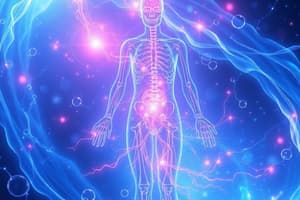Podcast
Questions and Answers
What is the role of lymph nodes in the immune system?
What is the role of lymph nodes in the immune system?
Lymph nodes filter out foreign bodies and pathogens, and they help to activate immune responses.
How do lymphatic vessels contribute to fluid regulation in the body?
How do lymphatic vessels contribute to fluid regulation in the body?
Lymphatic vessels help regulate the body's fluid balance by collecting excess interstitial fluid and returning it to the bloodstream.
What is the function of lymphatic vessels in nutrient absorption?
What is the function of lymphatic vessels in nutrient absorption?
In the gut, lymphatic vessels absorb fats and fat-soluble vitamins, transporting them to the bloodstream.
What are two waste products removed by lymphatic vessels?
What are two waste products removed by lymphatic vessels?
How do lymphatic vessels help transport proteins in the body?
How do lymphatic vessels help transport proteins in the body?
What is lymphedema and how is it characterized?
What is lymphedema and how is it characterized?
What are the effects of lymphedema on the body?
What are the effects of lymphedema on the body?
How does lymphatic massage benefit individuals?
How does lymphatic massage benefit individuals?
Why is understanding the functions of lymph important?
Why is understanding the functions of lymph important?
Study Notes
Understanding Lymph: The Body's Fluid Network and Its Essential Functions
Lymph is a clear, colorless fluid that circulates throughout the body, playing a vital role in maintaining health and fighting infection. This fluid differs from blood in that it doesn't have any blood cells, but rather serves as a transport and immune system support system. Let's explore the functions of lymph and how it contributes to our overall well-being.
Lymphatic System Components
To understand lymph, it's helpful to first get a grasp on the lymphatic system's components. This system includes:
- Lymphatic vessels: These vessels transport lymph and are connected to the body's tissues.
- Lymphatic organs: These include the spleen, thymus, tonsils, and lymph nodes.
- Lymph nodes: Small, bean-shaped organs that filter lymph and house immune cells.
Functions of Lymph
-
Immunity: Lymph nodes contain white blood cells, particularly lymphocytes that play a significant role in the immune response. Lymph nodes filter out foreign bodies and pathogens, and they also help to activate immune responses.
-
Fluid Regulation: Lymphatic vessels help to regulate the body's fluid balance by collecting excess interstitial fluid, which is any fluid outside the blood vessels, and returning it to the bloodstream.
-
Nutrient Absorption: In the gut, lymphatic vessels absorb fats and fat-soluble vitamins, which are then transported to the bloodstream.
-
Metabolic Waste Removal: Lymphatic vessels assist in removing waste products from cells, including carbon dioxide and lactic acid.
-
Protein Transport: Lymphatic vessels help transport proteins, such as antibodies, that are produced by the immune system.
Lymphedema: A Complication of Lymphatic System Dysfunction
When lymphatic vessels become damaged or obstructed, lymphedema can occur. Lymphedema is characterized by the accumulation of lymphatic fluid, resulting in swelling, often in the limbs. This condition can affect mobility, cause pain, and increase the risk of infection.
Lymphatic Massage: A Therapeutic Approach
Lymphatic massage is a gentle form of massage that can help stimulate the lymphatic system, assisting in the removal of excess fluid and waste products. This technique is often used to help manage lymphedema, but it can also benefit individuals who want to support their immune system or improve their overall health.
Conclusion
Lymph is a crucial component of the body's immune and fluid regulation systems, playing several essential roles in maintaining health and fighting infection. By understanding the functions of lymph, we can appreciate the importance of this unique fluid network and its integral role in our overall well-being.
Studying That Suits You
Use AI to generate personalized quizzes and flashcards to suit your learning preferences.
Description
Explore the essential functions of lymph, a clear fluid that circulates throughout the body and plays a crucial role in immunity, fluid regulation, nutrient absorption, waste removal, and protein transport. Learn about the components of the lymphatic system, complications like lymphedema, and therapeutic approaches like lymphatic massage.




